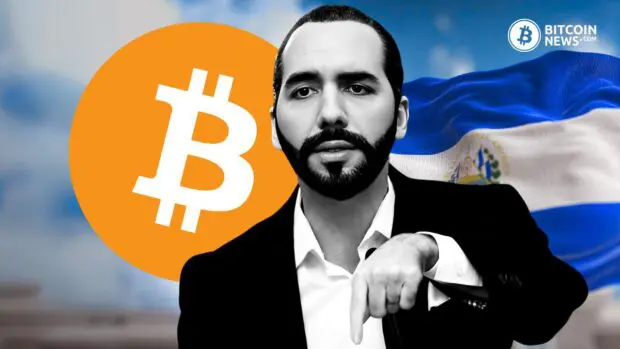Over the past few years, El Salvador has emerged as a groundbreaking player in the world of Bitcoin, experiencing significant regulatory and infrastructural shifts.
Salvadorans began voting this Sunday in the El Salvador elections to determine the country’s next president. This event has captured global attention, with the outcome holding potential ramifications for the digital asset landscape, particularly Bitcoin. Nayib Bukele, the incumbent president, sought re-election amid a backdrop of significant political and economic developments, influencing the nation’s stance on Bitcoin.
Winning the Election
With overwhelming support from voters, El Salvador former President Nayib Bukele has won the El Salvador elections again, securing his position as the president until 2029. According to reports, he secured a staggering 85% of votes.
He addresses a crowd from the balcony of National Palace, stating:
“All together the opposition was pulverized […] El Salvador went from being the most unsafe (country) to the safest. Now in these next five years, wait to see what we are going to do.”
It is important to note that Bukele had confirmed via X that he had won the elections hours before formal results were announced. He stated he will now serve as the president of the Central American country until 2029.
He added:
“Our country is small. We have no natural wealth, no exploitable resources, and we are very poor compared to the giants of the world. Salvadorans are paving their own way, and we want to be friends with everyone and respect all. We ask nothing from you, neither money, nor donations, nor international assistance. The only thing we ask for is RESPECT,”
The streets of El Salvador were decorated and firecrackers were burst as Bukele confirmed the victory of his “Nueva (New) Ideas Party”. He won the presidential election with more than 85% of the votes and his party secured a minimum of 58 of 60 deputies in the Assembly.
Bukele’s Bid for Re-Election
Bukele’s re-election is marked by widespread support, as evident by election’s results. Recent polls before elections also indicated approximately 80% voter approval. This significant backing stems from Bukele’s tough stance on gang violence, which plagued El Salvador for years. The 42-year-old president’s efforts have led to a substantial decrease in the murder rate, making the country safer and more stable.
El Salvador Elections: Implications for Bitcoin
Many were worried that the fate of Bitcoin in El Salvador was hanging in the balance, closely tied to Bukele’s political success. The president, known for his commitment to Bitcoin, transformed El Salvador into the first country to adopt Bitcoin as legal tender in 2021. The decision aimed to promote financial inclusion and reduce the costs associated with remittances, a significant source of income for the country.
Notably, the country recently received regulatory approval for its long-planned Volcano bonds, signaling a closer integration of the digital asset into the country’s financial landscape. The bonds, expected in early 2024, reflect the current government’s commitment to leveraging Bitcoin for economic growth and investment opportunities.
The recent victory of Bukele would likely reinforce and solidify the nation’s pro-Bitcoin stance.
Institutional Support and Market Optimism
Despite criticisms and controversies surrounding Bukele’s leadership style, the bitcoin market remains optimistic. According to President Bukele, the Bitcoin investment of the country has been in profit of $3.6 million, as of December 2023.
El Salvador’s commitment to Bitcoin has been underscored by institutional support, with the government expressing its intention to stay committed to the digital asset, irrespective of the election outcome. Notably, on Wednesday, the country’s vice president, Felix Ulloa, told Reuters:
“Not only will it (the law) be maintained, but at this moment, it enjoys the greatest credibility in the entire world.”
This institutional backing provides a level of certainty that the bitcoin community often seeks, potentially attracting further investment into the market.
El Salvador: A Pioneer in Adopting Bitcoin
El Salvador’s massive bitcoin adoption has contributed to a sense of optimism around the digital currency’s potential, not only as a financial asset but also as a tool for countries seeking economic growth.
The Central African Republic (CAR) drew inspiration directly from El Salvador, briefly becoming the second nation to embrace bitcoin as a legal currency in 2022. However, the endeavor faced several challenges in a country where approximately 90% of the population lacks internet access, leading to its closure in 2023.
Bukele’s government has left a lasting impact beyond its borders, evident in the dispatch of a team of “Bitcoin Ambassadors” to Argentina following the election of its latest president last November. Such outreach initiatives aim to solidify El Salvador’s position as the pioneer in adopting bitcoin as legal tender, with the expectation that others will follow suit.
Challenges and Criticisms
Despite the positive outlook, Bukele’s administration has faced criticism, including allegations of authoritarianism and human rights violations. The president’s self-description as “the world’s coolest dictator” has raised concerns, both domestically and internationally.
The continuation of Bukele’s presidency is likely to maintain the current legal framework supporting Bitcoin. Conversely, a change in leadership could have lead to a reevaluation of the country’s digital asset policies, introducing uncertainty into the market.
As El Salvador chooses Bukele as its president again, the implications for the bitcoin market remain substantial. Bukele’s commitment to Bitcoin, positions the nation as a key player in shaping the future relationship between governments and decentralized digital currencies.
As El Salvadorans celebrate this win, so do the Bitcoin investors and enthusiasts. Many believe this victory could have a huge potential ripple effects on the bitcoin landscape.










